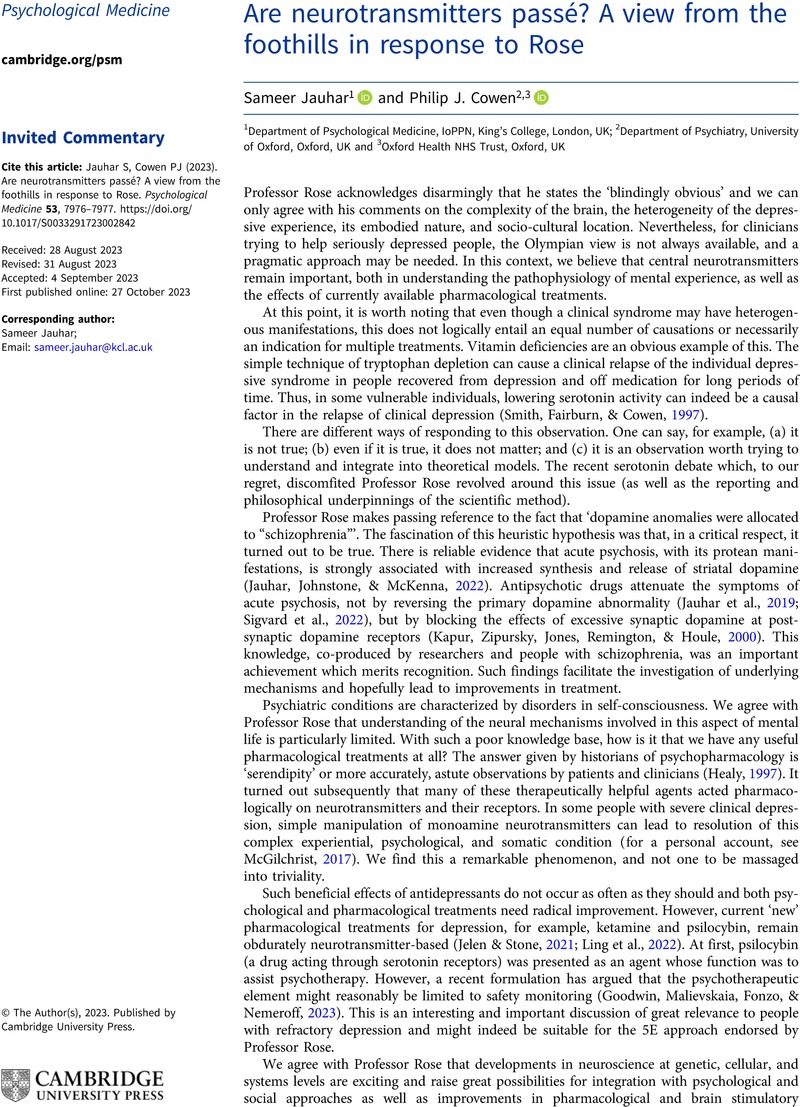No CrossRef data available.
Article contents
Are neurotransmitters passé? A view from the foothills in response to Rose
Published online by Cambridge University Press: 27 October 2023
Abstract
An abstract is not available for this content so a preview has been provided. Please use the Get access link above for information on how to access this content.

- Type
- Invited Commentary
- Information
- Copyright
- Copyright © The Author(s), 2023. Published by Cambridge University Press
References
Goodwin, G. M., Malievskaia, E., Fonzo, G. A., & Nemeroff, C. B. (2023). Must psilocybin always ‘assist psychotherapy?’ American Journal of Psychiatry. https://doi.org/10.1176/appi.ajp.20221043Google ScholarPubMed
Jauhar, S., Johnstone, M., & McKenna, P. J. (2022). Schizophrenia. Lancet (London, England), 399(10323), 473–486. https://doi.org/10.1016/S0140-6736(21)01730-XCrossRefGoogle ScholarPubMed
Jauhar, S., Veronese, M., Nour, M. M., Rogdaki, M., Hathway, P., Natesan, S., … Howes, O. D. (2019). The effects of antipsychotic treatment on presynaptic dopamine synthesis capacity in first-episode psychosis: A positron emission tomography study. Biological Psychiatry, 85(1), 79–87. https://doi.org/10.1016/j.biopsych.2018.07.003CrossRefGoogle ScholarPubMed
Jelen, L. A., & Stone, J. M. (2021). Ketamine for depression. International Review of Psychiatry, 33(3), 207–228. https://doi.org/10.1080/09540261.2020.1854194CrossRefGoogle ScholarPubMed
Kapur, S., Zipursky, R., Jones, C., Remington, G., & Houle, S. (2000). Relationship between dopamine D2 occupancy, clinical response, and side effects: A double-blind PET study of first-episode schizophrenia. American Journal of Psychiatry, 157(4), 514–520. https://doi.org/10.1176/appi.ajp.157.4.514CrossRefGoogle ScholarPubMed
Ling, S., Ceban, F., Lui, L. M. W., Lee, Y., Teopiz, K. M., Rodrigues, N. B., … McIntyre, R. S. (2022). Molecular mechanisms of psilocybin and implications for the treatment of depression. CNS Drugs, 36(1), 17–30. https://doi.org/10.1007/s40263-021-00877-yCrossRefGoogle ScholarPubMed
McGilchrist, I. (2017). Depression is not like anything on earth. In Foster, C., & Herring, J. (Eds.), Depression: law and ethics. Oxford: Oxford University Press.Google Scholar
Sigvard, A. K., Nielsen, M. Ø., Gjedde, A., Bojesen, K. B., Fuglø, D., Tangmose, K., … Glenthøj, B. Y. (2022). Dopaminergic activity in antipsychotic-naïve patients assessed with positron emission tomography before and after partial dopamine D2 receptor agonist treatment: Association with psychotic symptoms and treatment response. Biological Psychiatry, 91(2), 236–245. https://doi.org/10.1016/j.biopsych.2021.08.023CrossRefGoogle ScholarPubMed
Smith, K. A., Fairburn, C. G., & Cowen, P. J. (1997). Relapse of depression after rapid depletion of tryptophan. Lancet (London, England), 349(9056), 915–919. https://doi.org/10.1016/s0140-6736(96)07044-4CrossRefGoogle ScholarPubMed



